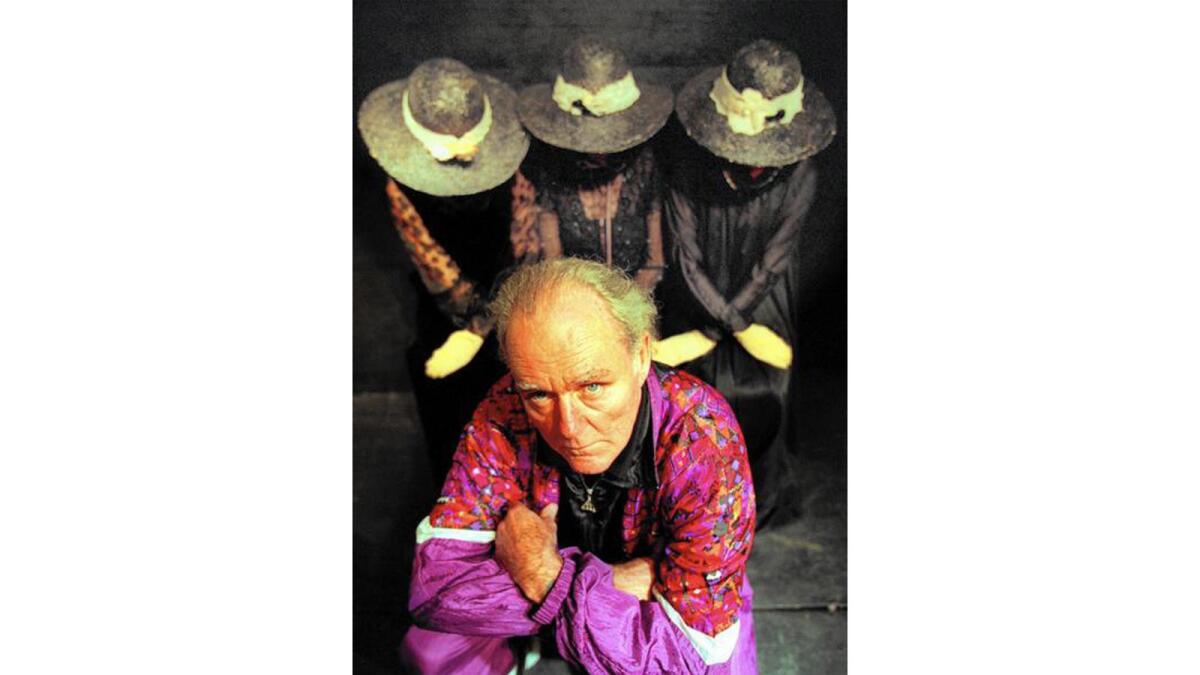Rick Cluchey, ex-con, playwright and Samuel Beckett collaborator, dies at 82

Rick Cluchey, founder of the San Quentin Drama Workshop, with his actresses in “Beckett’s Women,” a play he directed in 1998.
- Share via
Rick Cluchey was in his third year of a life sentence without parole for the carjacking and armed robbery of a Los Angeles hotel courier when actors came to San Quentin State Prison in 1957 to perform “Waiting for Godot.” The existential play struck a nerve, and inspired the creation of a drama workshop at San Quentin.
For Cluchey, a pugilistic convict considered too great a risk to even attend the play, it changed his life. He listened from his cell to the lines over the public address system. His cellmate returned from the performance struck in particular by one character, Lucky, who was led about with a rope around his neck.
Right there, Cluchey later recounted, “we knew the score.”
Samuel Beckett had captured the essence of imprisonment.
And in Cluchey, another playwright was born.
Cluchey died Monday evening near his home in Culver City from emphysema, congestive heart failure and chronic lung disease. He was 82.
The brawler from Chicago joined the new theater troupe at San Quentin and from his cell started writing plays. The first was “The Cage,” a prison drama about inmates putting one another on trial. That play, along with a letter from his sentencing judge, made the case for then-Gov. Pat Brown to commute Cluchey’s sentence to allow parole, and his eventual release in 1966.
With the Barbwire Theater company, a troupe of ex-cons, Cluchey took “The Cage” on a national tour including Broadway and college campuses. He held drama workshops in prisons and spoke against the harshness of incarceration.
Cluchey became a leading interpreter of Beckett’s work, and spent most of his career traveling the world to perform in his plays. He signed on as an assistant director to Beckett in a Berlin performance of “Godot.” Later, Beckett directed Cluchey as an actor, in “Krapp’s Last Tape” and “Endgame.”
Purdue film professor Lance Duerfahrd, an authority on Beckett, saw in the two men what he described as “an infection,” but one so mutually beneficial it was difficult to distinguish virus and host. Cluchey was “thoughtful, impulsive, and a little violent, a boxer to the core ... a lover of Beckett but also someone Beckett loved.”
Duerfahrd said Cluchey was drawn by Beckett's “strange appeal” to an uncommon audience, the incarcerated. The Irish playwright created difficult characters that he set on gaunt stages, in silence or with lines such as:
“I can’t go on like this.”
“That’s what you think.”
“Shakespeare. Everyone loves Shakespeare. But Beckett?” Duerfahrd said. “No one understands him.”
But prisoners do.
“They take to him immediately,” Duerfahrd said. “They see the violence in Beckett. They see the coercion.”
From the Archives: Pair Sentenced for Kidnapping but One May Get Mercy
“The thing that everyone in San Quentin understood about Beckett while the rest of the world had trouble catching up, was what it meant to be in the face of it,” Cluchey told a Los Angeles Times writer in 1987. At the time his life was being loosely adapted to film — the movie “Weeds,” in which Cluchey's character is played by Nick Nolte.
“I mean,” Cluchey said, “he's dealing with a lost people.”
Duerfahrd wrote a book on what he titled Beckett’s “vagabonds and the theater of crisis” and is doing a documentary on Cluchey. He said he saw in the convict-turned-actor and playwright a man required by Beckett’s roles — or was it enabled? — to constantly re-create the inner mind of a prisoner, or as Beckett once instructed Cluchey, “to make it your own in terms of incarceration.”
Even as his health deteriorated, Cluchey remained engaged in theater. Last month, he lectured to a drama class at Whittier College and read a scene from Beckett alongside his wife, Nora Masterson. He rallied for the audience, she said, “but that night at the hotel, it was a nightmare.”
The family plans a memorial service Jan. 18 at St. Paul the Apostle church in Los Angeles.
Duerfahrd intends to finish the documentary to include a spring production of “Endgame,” to be performed at the Kirk Douglas Theatre in Culver City.
Cluchey had been cast in that play alongside Alan Mandell, one of the actors who came to San Quentin to perform “Godot” in 1957, and who returned to help him start the San Quentin Drama Workshop.
In that role, Cluchey was to spend the whole of the play confined within a trash can.
Start your day right
Sign up for Essential California for the L.A. Times biggest news, features and recommendations in your inbox six days a week.
You may occasionally receive promotional content from the Los Angeles Times.




